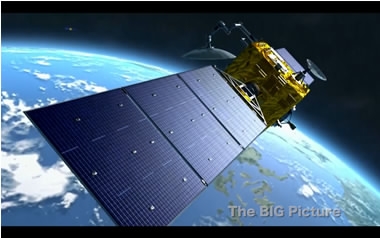
China
12:13, 19-Sep-2017
The Big Picture: Eyes in the sky
Han Bin, Huang Xiaodong

Civil-military partnerships and integration are a growing trend across the globe. To find out what’s helping to drive China’s military transformation, CGTN correspondents spoke to Zhou Ruxin, founder of BDStar, a leading private company in navigation and positioning.
Tracking the changes
This is our second interview with BDStar in just four years. The company grew from scratch, and is now expanding into overseas markets. It’s China’s first listed company in the sector, and one of the few private firms to provide national defense equipment.

Inside BDStar. /CGTN Photo
Inside BDStar. /CGTN Photo
Zhou Ruxin, chairman of the board, Beijing BDStar Navigation Co. Ltd., is behind the civilian application of the company’s technology. Zhou says civil-military cooperation is helping drive innovation. “The civil-military integration has great significance for improving the quality of weaponry and reducing military expenditure.”
China launched the first satellite for its navigation system, BeiDou -- which translates as the Big Dipper – in 2000. It’s an alternative to the US Global Positioning System, commonly known as GPS.

Satellite used by BeiDou for navigation and positioning. /CGTN Photo
Satellite used by BeiDou for navigation and positioning. /CGTN Photo
Fishery navigation is one of the main civilian uses. Some 50,000 vessels have so far installed BDStar equipment. And now the company has a growing number of military orders.
Zhou Ruxin says BeiDou can provide position accuracy to a precision of under 10 meters. He showed us the company's latest product -- the world’s smallest chip, less than three millimeters in length. It meets top world standards, and is just one of various chips developed by BDStar for both civilian and military purposes.

BDStar latest product -- the world’s smallest chip, less than three millimeters in length. It meets top world standards. /CGTN Photo
BDStar latest product -- the world’s smallest chip, less than three millimeters in length. It meets top world standards. /CGTN Photo
Lift-off for BeiDou was in 2000, with its first satellite. It expects to achieve global coverage by 2020.
Zhou Ruxin is confident that civil-military integration will continue, because at BeiDou he has seen the bigger picture.

Zhou Ruxin shows a CGTN correspondent the new chips. /CGTN Photo
Zhou Ruxin shows a CGTN correspondent the new chips. /CGTN Photo
The concept of adopting Chinese military technologies for civilian use has been around for decades. The difference is that it’s now viewed as an important national strategy, one that will give companies like BDStar a competitive edge.
BeiDou Navigation Satellite System
BeiDou Navigation Satellite System has been developed independently in China. There are three main parts: the space section, the ground section, and the user section. The space section contains five geostationary orbit satellites and 30 non-geostationary orbit satellites. The ground section consists of a certain number of stations. And the user section includes terminators of the BeiDou system, some of which are compatible with other navigation satellite systems.
Previous episodes:

SITEMAP
Copyright © 2018 CGTN. Beijing ICP prepared NO.16065310-3
Copyright © 2018 CGTN. Beijing ICP prepared NO.16065310-3